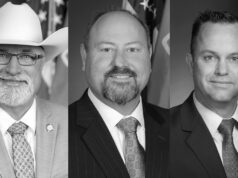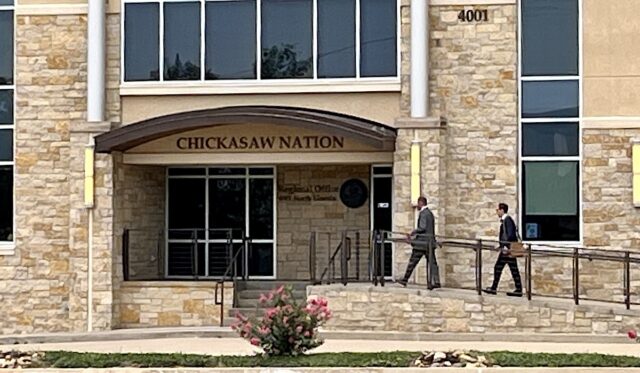

Behind the scenes of their tense public disagreements on a variety of policy, political and legal matters, Oklahoma Gov. Kevin Stitt and Chickasaw Nation Gov. Bill Anoatubby have exchanged several emails over the past two months negotiating a possible extension of a state-tribal tobacco tax compact set to expire at the end of the year. The emails were polite, business-like and personal.
Those negotiations and discussions reached a new level Thursday afternoon when Stitt’s chief of staff and legal counsel met with Chickasaw executives at the tribe’s Oklahoma City headquarters, about a mile north of the State Capitol. Retired Oklahoma Supreme Court Justice Steven Taylor was in attendance as a neutral third party and potential mediator, a role he played this spring during heated negotiations between Stitt and legislative leaders that culminated in a historic school choice and education funding agreement.
Taylor’s engagement Thursday comes days before the Oklahoma Legislature is set to resume its special session Monday, where the State Senate is expected to try for a second time to override Stitt’s veto of a bill that would extend all current tobacco tax compacts through the end of 2024.
Stitt’s team and his allies at the Oklahoma Council of Public Affairs have lobbied against SB 26X, which he vetoed May 31. On June 26, the Senate fell one vote shy of a required two-thirds supermajority during President Pro Tempore Greg Treat’s first attempt to override the veto. There is no limit on override attempts, and Treat (R-OKC) pledged that he would have the votes in July.
All the while, however, Stitt and Anoatubby have been emailing about finding a potential compromise that could become their first major agreement to rise out of a sea of dispute. In fact, ahead of Thursday’s meeting, public relations appeared to get worse before they got better.
On July 14, Anoatubby joined his four peers on the Inter-Tribal Council of the Five Civilized Tribes in signing a resolution asking the Oklahoma Legislature to override SB 26X and HB 1005X (extending motor vehicle compacts). In the resolution, tribal leaders wrote that Stitt “continues to refuse to negotiate in good faith with tribes on compact extensions.”
But Stitt and Anoatubby were already working out details for their representatives’ planned July 20 meeting, and the public proclamation that he was refusing to negotiate “in good faith” bothered Stitt and his team.
“Some tribal governments have been trying to mislead you, signing a resolution claiming that I am refusing to negotiate on expiring compacts. I am here to set the record straight,” Stitt said in a video response late Wednesday. “The claims in this resolution couldn’t be farther from the truth. For months, I have been trying to work with tribal governments and to protect Oklahoma taxpayers. In April, representatives from a few tribal governments and members of my staff reached an agreement to begin negotiations on the tobacco compacts in June. In May, we were informed that they had reached out to legislative leadership, trying to circumvent the historical and legal process and ask the Legislature for a better deal.”
Anoatubby: ‘We look forward to our meeting on July 20’
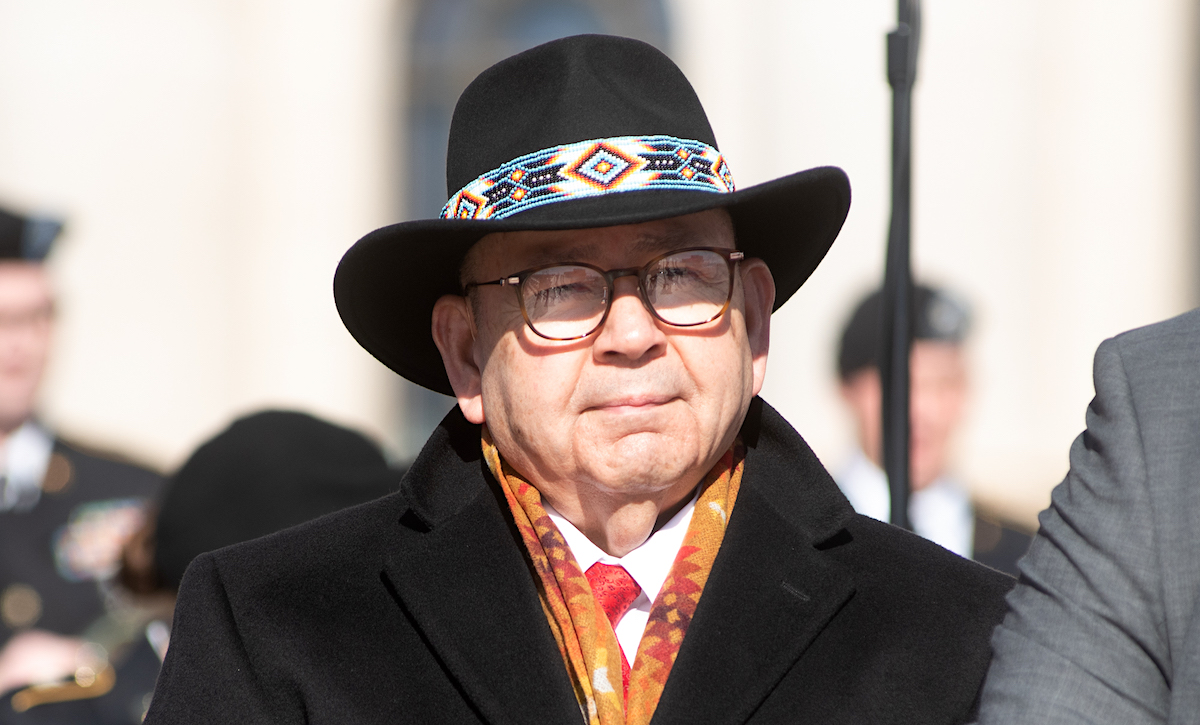
Less than 24 hours after their boss released his video responding to the Five Tribes’ resolution, Stitt’s chief of staff, Brandon Tatum, and general counsel, Trevor Pemberton, pulled into the parking lot of the Chickasaw Nation’s OKC headquarters and walked through its front doors. About 30 minutes prior, clad in a seersucker suit after driving in from McAlester, retired Supreme Court Justice Steven Taylor had done the same.
Taylor declined to comment Thursday about the day’s discussions. Tatum also declined to discuss specifics of the roughly two-and-a-half-hour meeting, but he did praise Taylor’s presence.
“While we agreed to not discuss details of our meeting it was once again valuable to have Justice Taylor in the meeting,” Tatum said.
About an hour after the publication of this article, Tony Choate, executive officer of media affairs for the Chickasaw Nation, provided statements from Anoatubby and Stephen Greetham, a longtime attorney who represents the tribe.
“It has always been our approach to work with the Oklahoma governor, regardless of who holds that office and regardless of our disagreements. We remain at the beginning of a long process to establish a durable tobacco compact, and we thank the Oklahoma Legislature for working to provide the time for that work to be done right,” Anoatubby said. “We call on the Oklahoma Legislature to complete its work and override the Oklahoma Governor’s vetoes of the compact extender bills.”
Greetham criticized Stitt’s team and said they considered the meeting “a stunt.”
“Yesterday was the first face-to-face meeting Chickasaw Nation representatives had with representatives of the Oklahoma governor to discuss the tobacco compact. We met to start a dialogue on how we might work on what his own chief of staff referred to as our ‘broken relationship.’ We came to the table in good faith,” Greetham said. “It now appears the Oklahoma governor’s team used that meeting as a stunt for disrupting the Oklahoma Legislature’s proceedings this coming Monday. We believe that stunt underscores the need for the Senate to act now. In fact, we believe the day may have arrived for the Oklahoma Legislature to take control of these issues away from this administration.”
Under the Oklahoma Open Records Act, NonDoc requested emails between Stitt and Anoatubby on the tobacco compact topic, and the responsive documents revealed a cordial and substantive conversation between the two heads of state since May.
They also revealed that Taylor’s attendance as a neutral third party and potential mediator had been a matter of some dispute leading up to Thursday’s meeting.
“We look forward to our meeting on July 20 and to the opportunity for us to discuss how we could build a long-term and durable framework that is effective and beneficial for all parties,” Anoatubby wrote to Stitt the morning of Monday, July 17. “We believe the state and tribes working in respectful cooperation with clear goals and using history as our guide has consistently produced good results.”
But Anoatubby proposed that an initial meeting should not include Taylor.
“With respect to your recent request, we are not closed to having a third-party participant help us in our efforts. We have the greatest respect and admiration for Justice Stephen (sic) Taylor. If needed, he would bring his skills at conflict resolution to the table. His abilities could prove helpful, particularly when an impasse has been encountered. I believe he is not currently needed, however. For this initial meeting, it would be enough for us to come together, listen, and make sure we understand the proposals and issues we have each laid on the table. In our experience, that sort of exchange is best suited to helping us find the path we need. And with that sort of mutual understanding, we could determine whether and how a third party’s assistance might be useful to this government-to-government process. Accordingly, at this time, we would prefer moving forward without a third-party facilitator.”
Stitt responded about two hours later, offering Anoatubby condolences and prayers on a personal matter and emphasizing his desire that Taylor be in attendance for the first meeting.
“I appreciate the response and what appears to be agreement that Justice Taylor would provide value to meaningful dialogue and negotiations. While I know our respective representatives will come together, listen, and seek to understand issues at the initial meeting, our intent is also to more meaningfully discuss and negotiate terms at the initial meeting, even if an agreement is not reached at that time,” Stitt wrote. “By Justice Taylor being present at the initial meeting, he will be able to gain context necessary for any future meetings and help facilitate more meaningful discussions, as necessary. With those concepts in mind, we have confirmed Justice Taylor’s availability for Thursday’s meeting at the Chickasaw Nation’s Oklahoma City office, and respectfully, have asked him to plan to be present so that we do not miss the opportunity to meaningfully work toward an agreement. My team looks forward to productive dialogue and material discussions that I trust will lead to a fair deal for all involved.”
Around 9 a.m. Wednesday, Anoatubby responded to Stitt.
“While we prefer a different approach, we will honor our commitment to meet,” he said.
Stitt: ‘I genuinely appreciate your engagement in this negotiation’
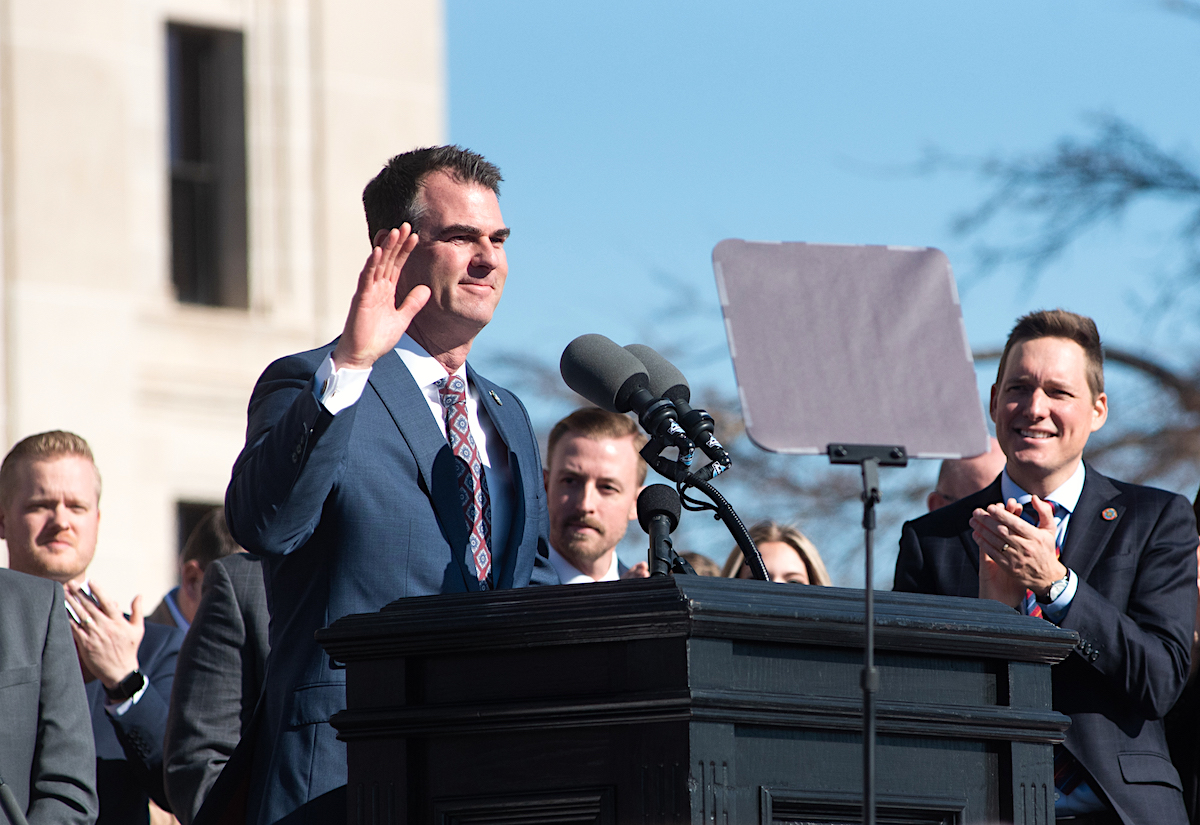
Thursday’s meeting — first proposed by Anoatubby on June 22 — followed two months of emails between Stitt and Anoatubby regarding the tobacco compact, which was first established in 1992 as a way for the state to collect sales taxes on at least a portion of tobacco products sold by tribal interests to non-tribal consumers. If Stitt and Anoatubby are able to bridge their gap and agree upon a revised tobacco compact, other tribes with tobacco compacts could follow suit.
A 1991 landmark U.S. Supreme Court case — Oklahoma Tax Commission v. Citizen Band Potawatomi Indian Tribe of Oklahoma — affirmed states’ rights to tax non-tribal citizens who purchase tobacco on tribal land, and Oklahoma began signing tobacco compacts with tribal nations in 1992.
In the decades since, those compacts have seen their terms and conditions modified, with temporary extensions occasionally offered as Oklahoma governors and tribal leaders have negotiated renewals. Essentially, the compacts specify that taxes on tobacco products are collected at the wholesale level, and the state of Oklahoma eventually rebates a percentage — currently 50 percent in most compacts — back to tribal nations as payment for tobacco products sold by tribal entities to tribal citizens, which are exempt from state taxation.
For Fiscal Year 2022, Oklahoma Tax Commission data indicate that $90.7 million in excise taxes were collected on cigarettes sold to tribal-owned businesses, and $23.8 million in excise taxes were collected on pipe tobacco, chewing tobacco and large cigars. The state of Oklahoma rebated more than $57.6 million back to compacting tribal nations in FY 2022.
On the topic of renewing or renegotiating the tobacco compacts this year, Stitt’s administration has primarily expressed concern about the definition of compact jurisdiction. Mostly signed in or around 2013, the existing tobacco compacts define that jurisdiction as “Indian Country,” a federal legal designation that includes reservation lands. With the U.S. Supreme Court functionally affirming the continued existence of Indian Country reservations for the Muscogee, Chickasaw, Choctaw, Cherokee, Seminole, Quapaw, Ottawa and Peoria nations in the 2020 McGirt v. Oklahoma ruling on criminal jurisdiction, questions about whether those reservations also exist for civil jurisdiction purposes have loomed, sometimes in court.
As Stitt and Anoatubby emailed each other draft and redlined tobacco compact offers over the past two months, their correspondence highlights the jurisdictional definition dispute, although it is not the only unresolved component.
On May 18, Stitt sent Anoatubby a compact extension offer maintaining the 50-50 tax revenue split and adjusting the jurisdictional language to specify application only on allotment lands and trust lands, two types of “Indian Country” land in Oklahoma prior to the McGirt decision.
On May 24, Anoatubby provided a counter offer and outlined a pair of changes:
Governor Stitt:
Thank you for your offer of May 18, 2023, concerning our tobacco compact. We look forward to continuing our efforts to improve upon the framework the State of Oklahoma and First American Tribes/Nations first established in 1992 (68 O.S. § 346).
We believe this durable agreement has served all Oklahomans well over the past 30 years. We appreciate your engagement. Likewise, we appreciate the Oklahoma Legislature’s taking action to ensure all compacted or previously compacted First American Tribes/Nations can continue to work within this intergovernmental agreement. We understand coming to terms will require hard work, and we are committed to working in good faith with the State of Oklahoma throughout the process. As mentioned in my last email, attached is the Chickasaw Nation’s counteroffer enclosed as both a PDF titled “Redline,” to highlight the changes we would make, as well as a Word document titled “Clean”. We look forward to continuing this discussion.
As briefly explained in the enclosed transmittal letter, our counteroffer would implement the following changes relative to your proposal—
1. Consistent with your proposal, we would limit “Compact Jurisdiction” to trust and restricted lands within our reservation but also include an express declaration that nothing in the compact waives or prejudices either party’s legal rights or positions outside those lands. We mean this to be favorably responsive to your proposal. Our hope is to continue an agreement based on principles that both the State and the Chickasaw Nation can accept and to reserve other matters for another time.
2. To increase stability and provide a real opportunity for investment and operational planning, we would make our tobacco compact term mirror what the Oklahoma Legislature provides for motor fuel compacts, see 68 O.S. § 500.63(C)(8)—namely, a ten-year renewing term with a time-limited window to withdraw. This revision would strike the unilateral termination provision of the 2013 compact.
In addition to those substantive changes, we have also proposed a rework of the preamble “whereas” clauses, both to update the clauses and offer a clearer statement of context and objectives. These revisions would, again, highlight the goal of mutual benefit and the express disclaimer of any waiver or prejudice relative to either party’s legal position concerning nontrust/non-restricted lands.
We would be pleased to discuss these matters further and to consider any additional revisions or refinements you believe would be appropriate and advisable. Please feel free to contact me should you have any questions.
Bill Anoatubby, Governor
The Chickasaw Nation
Following an initial cordial reply confirming receipt, Stitt responded with a June 6 letter:
Dear Governor Anoatubby:
This follows our recent exchange regarding the tobacco tax compact between the State of Oklahoma and the Chickasaw Nation. I genuinely appreciate your engagement in this negotiation. Before addressing any other concerns associated with the counteroffer you emailed on May 24th, 2023, it is critically important to first have a firm, mutual understanding of what is intended regarding “Compact Jurisdiction.”
In your May 24th, email to me, you indicated, in relevant part, that the Chickasaw Nation “would limit ‘Compact Jurisdiction’ to trust and restricted lands within our reservation but also include an express declaration that nothing in the compact waives or prejudices either party’s legal rights or positions outside those lands.”
On behalf of the state, I need to gain more clarity regarding the Chickasaw Nation’s current and anticipated future position regarding the limits of the “Compact Jurisdiction” in the tobacco tax context. For instance, if the compact were to contain language consistent with the language the Chickasaw Nation proposed in Article II, Paragraph 1 of the counteroffer—namely, reference to 68 O.S. 348(3)(a) and 348(3)(d)—will the Nation later point to such language in support of an argument that the “Compact Jurisdiction” extends beyond trust and restricted lands? Again, please do not hesitate to contact me directly with any questions or to further discuss. You are also free to have a representative reach out to my general counsel.
Sincerely,
J. Kevin Stitt
Governor
On June 12, Stitt followed up with another letter offering a one-year extension of the compact with the revised jurisdictional language, the removal of the unilateral termination provision, and a footnote saying the compact’s language “shall have no effect on or be utilized in any litigation pending at the time this compact is executed.” The footnote specifically referenced Stroble v. Oklahoma Tax Commission, a case pending before the Oklahoma Supreme Court that asks whether the state has authority to tax the income of a tribal citizen who lives within reservation boundaries and whose income is derived from a tribally controlled source.
Anoatubby responded to Stitt on June 22 and proposed the meeting that ultimately occurred Thursday.
“Thank you for your latest proposal and the work that it took to prepare. This has been a helpful exchange, but we can likely accomplish only so much by email,” Anoatubby wrote. “I propose we each designate representatives to meet in person. Our representatives could explore the issues our proposals have framed in more depth and endeavor to identify paths we might take from here. I would be happy to send a high-level member of my cabinet and legal counsel to represent the Chickasaw Nation and meet with your representatives for purposes of coming to terms on this compact. Please let me know your thoughts about this option.”
At Thursday’s meeting, chief of staff Brandon Tatum and general counsel Trevor Pemberton represented Stitt’s administration, while Secretary of Commerce Dan Boren, Assistant Secretary of Commerce Frank Johnson, Jr. and former senior counsel Stephen Greetham represented Anoatubby’s administration.
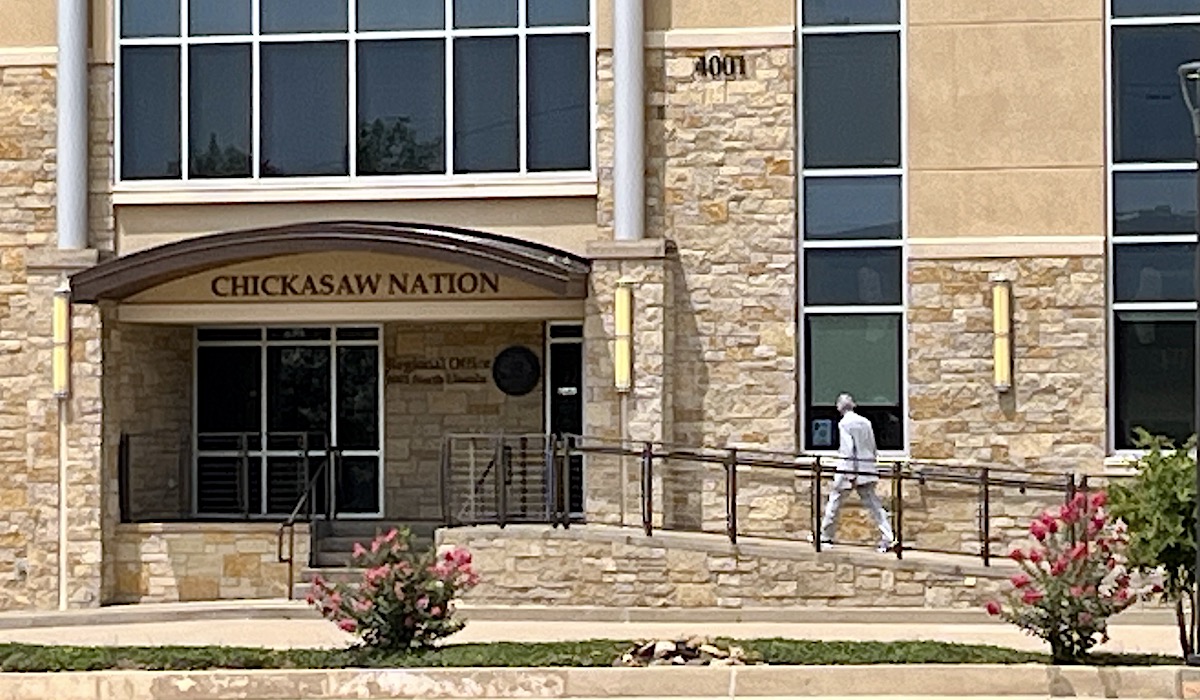
(Update: This article was updated at 3:33 p.m. Friday, July 21, to include new statements from Anoatubby and Greetham.)














